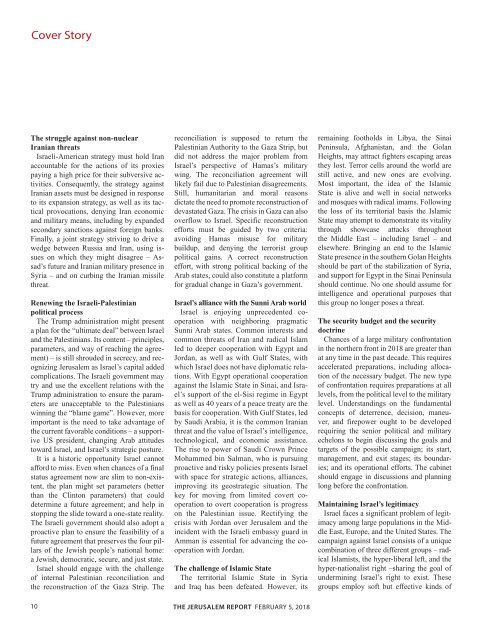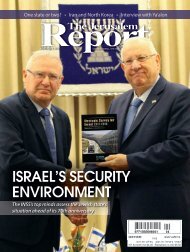All small
Create successful ePaper yourself
Turn your PDF publications into a flip-book with our unique Google optimized e-Paper software.
Cover Story<br />
The struggle against non-nuclear<br />
Iranian threats<br />
Israeli-American strategy must hold Iran<br />
accountable for the actions of its proxies<br />
paying a high price for their subversive activities.<br />
Consequently, the strategy against<br />
Iranian assets must be designed in response<br />
to its expansion strategy, as well as its tactical<br />
provocations, denying Iran economic<br />
and military means, including by expanded<br />
secondary sanctions against foreign banks.<br />
Finally, a joint strategy striving to drive a<br />
wedge between Russia and Iran, using issues<br />
on which they might disagree – Assad’s<br />
future and Iranian military presence in<br />
Syria – and on curbing the Iranian missile<br />
threat.<br />
Renewing the Israeli-Palestinian<br />
political process<br />
The Trump administration might present<br />
a plan for the “ultimate deal” between Israel<br />
and the Palestinians. Its content – principles,<br />
parameters, and way of reaching the agreement)<br />
– is still shrouded in secrecy, and recognizing<br />
Jerusalem as Israel’s capital added<br />
complications. The Israeli government may<br />
try and use the excellent relations with the<br />
Trump administration to ensure the parameters<br />
are unacceptable to the Palestinians<br />
winning the “blame game”. However, more<br />
important is the need to take advantage of<br />
the current favorable conditions – a supportive<br />
US president, changing Arab attitudes<br />
toward Israel, and Israel’s strategic posture.<br />
It is a historic opportunity Israel cannot<br />
afford to miss. Even when chances of a final<br />
status agreement now are slim to non-existent,<br />
the plan might set parameters (better<br />
than the Clinton parameters) that could<br />
determine a future agreement; and help in<br />
stopping the slide toward a one-state reality.<br />
The Israeli government should also adopt a<br />
proactive plan to ensure the feasibility of a<br />
future agreement that preserves the four pillars<br />
of the Jewish people’s national home:<br />
a Jewish, democratic, secure, and just state.<br />
Israel should engage with the challenge<br />
of internal Palestinian reconciliation and<br />
the reconstruction of the Gaza Strip. The<br />
reconciliation is supposed to return the<br />
Palestinian Authority to the Gaza Strip, but<br />
did not address the major problem from<br />
Israel’s perspective of Hamas’s military<br />
wing. The reconciliation agreement will<br />
likely fail due to Palestinian disagreements.<br />
Still, humanitarian and moral reasons<br />
dictate the need to promote reconstruction of<br />
devastated Gaza. The crisis in Gaza can also<br />
overflow to Israel. Specific reconstruction<br />
efforts must be guided by two criteria:<br />
avoiding Hamas misuse for military<br />
buildup, and denying the terrorist group<br />
political gains. A correct reconstruction<br />
effort, with strong political backing of the<br />
Arab states, could also constitute a platform<br />
for gradual change in Gaza’s government.<br />
Israel’s alliance with the Sunni Arab world<br />
Israel is enjoying unprecedented cooperation<br />
with neighboring pragmatic<br />
Sunni Arab states. Common interests and<br />
common threats of Iran and radical Islam<br />
led to deeper cooperation with Egypt and<br />
Jordan, as well as with Gulf States, with<br />
which Israel does not have diplomatic relations.<br />
With Egypt operational cooperation<br />
against the Islamic State in Sinai, and Israel’s<br />
support of the el-Sisi regime in Egypt<br />
as well as 40 years of a peace treaty are the<br />
basis for cooperation. With Gulf States, led<br />
by Saudi Arabia, it is the common Iranian<br />
threat and the value of Israel’s intelligence,<br />
technological, and economic assistance.<br />
The rise to power of Saudi Crown Prince<br />
Mohammed bin Salman, who is pursuing<br />
proactive and risky policies presents Israel<br />
with space for strategic actions, alliances,<br />
improving its geostrategic situation. The<br />
key for moving from limited covert cooperation<br />
to overt cooperation is progress<br />
on the Palestinian issue. Rectifying the<br />
crisis with Jordan over Jerusalem and the<br />
incident with the Israeli embassy guard in<br />
Amman is essential for advancing the cooperation<br />
with Jordan.<br />
The challenge of Islamic State<br />
The territorial Islamic State in Syria<br />
and Iraq has been defeated. However, its<br />
remaining footholds in Libya, the Sinai<br />
Peninsula, Afghanistan, and the Golan<br />
Heights, may attract fighters escaping areas<br />
they lost. Terror cells around the world are<br />
still active, and new ones are evolving.<br />
Most important, the idea of the Islamic<br />
State is alive and well in social networks<br />
and mosques with radical imams. Following<br />
the loss of its territorial basis the Islamic<br />
State may attempt to demonstrate its vitality<br />
through showcase attacks throughout<br />
the Middle East – including Israel – and<br />
elsewhere. Bringing an end to the Islamic<br />
State presence in the southern Golan Heights<br />
should be part of the stabilization of Syria,<br />
and support for Egypt in the Sinai Peninsula<br />
should continue. No one should assume for<br />
intelligence and operational purposes that<br />
this group no longer poses a threat.<br />
The security budget and the security<br />
doctrine<br />
Chances of a large military confrontation<br />
in the northern front in 2018 are greater than<br />
at any time in the past decade. This requires<br />
accelerated preparations, including allocation<br />
of the necessary budget. The new type<br />
of confrontation requires preparations at all<br />
levels, from the political level to the military<br />
level. Understandings on the fundamental<br />
concepts of deterrence, decision, maneuver,<br />
and firepower ought to be developed<br />
requiring the senior political and military<br />
echelons to begin discussing the goals and<br />
targets of the possible campaign; its start,<br />
management, and exit stages; its boundaries;<br />
and its operational efforts. The cabinet<br />
should engage in discussions and planning<br />
long before the confrontation.<br />
Maintaining Israel’s legitimacy<br />
Israel faces a significant problem of legitimacy<br />
among large populations in the Middle<br />
East, Europe, and the United States. The<br />
campaign against Israel consists of a unique<br />
combination of three different groups – radical<br />
Islamists, the hyper-liberal left, and the<br />
hyper-nationalist right –sharing the goal of<br />
undermining Israel’s right to exist. These<br />
groups employ soft but effective kinds of<br />
10<br />
THE JERUSALEM REPORT FEBRUARY 5, 2018
















